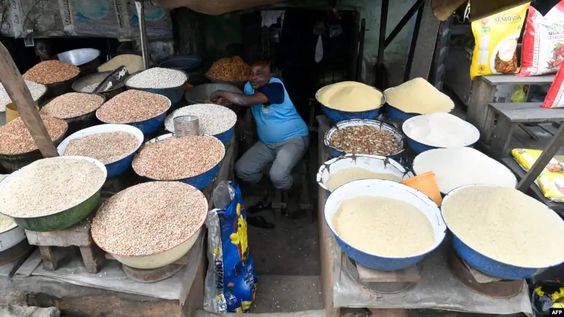Africa
Nigeria’s food inflation is causing worry among experts who fear it may worsen the existing hunger crisis

Nigeria, the most populous country in Africa, is home to millions of people who are suffering from economic issues that experts claim were partially brought on by earlier this year’s government reform initiatives.
Nigeria eliminated gasoline subsidies in May, which resulted in increases in the cost of electricity, food, and transportation. The National Bureau of Statistics revealed data last week that indicated Nigeria’s inflation reached an 18-year high of 27.3%. According to analysts, the tendency may make matters worse for the estimated 25 million people who are food insecure in the nation.
Vivian Nwankwo, a Nigerian street food vendor, founded her company four years ago to help support her family following the death of her husband.
However, she claimed that due to the ongoing increase in food prices, her profit margin has decreased by more than half, forcing her to pull two of her kids out of school in order to have more money for food.
“Before we were managing, but now things are too expensive,” Nwankwo stated. It is challenging to get by or turn a profit. At the end of the day, when people are whining, sometimes I don’t know what to do. Even my two school-age children do not attend every day since I am not always able to support them.”
Similar to Nwankwo, millions of Nigerians struggle to meet their fundamental requirements.
According to UN estimates, 25 million Nigerians, or roughly 15% of the country’s entire population, live in food insecurity.
READ ALSO: Flooding in Nigeria has resulted in displacement of 650,000 children over course of 7 years- UNICEF
According to analysts, the main causes of food insecurity in Nigeria are inflation, climate change, and regional instability. After the government stopped providing fuel subsidies in May, the situation got worse as the price of food, transportation, and electricity increased significantly.
Commodity prices are being impacted by Nigeria’s currency devaluation, which is also causing general inflation.
A state of emergency on food security has been declared by the authorities in response to the issues, according to Nigerian Minister of Humanitarian Affairs Betta Edu.
“We have lots of interventions that we’re putting on the table and the payments of this conditional cash transfer is ongoing,” Edu stated. “It comes with requirements that they make investments in their companies and make sure their kids attend school. All of these aim to make people’s lives better and reduce poverty. The third component involves giving local farmers who are in need of fertiliser so they can grow food, which we will then purchase and distribute as food rations.”
Nigeria is among the nations with the greatest food expenditures, with an estimated 60% of total personal income going towards food, according to the World in Data research.
Experts predict that if food inflation keeps rising, things will get worse and that those who are already weak will suffer the most.
Despite growing inflation, the Nigerian Central Bank on Monday postponed indefinitely a key meeting on interest rates.
Many Nigerians, including Nwankwo, would find it difficult to make ends meet unless something changes, according to analysts.
